Around the Bloc: Controversial Russian Anti-Terrorism Law Hits First Target
Krishna follower faces sanctions for speaking to passers-by and handing out religious books.
More...We kindly inform you that, as long as the subject affiliation of our 300.000+ articles is in progress, you might get unsufficient or no results on your third level or second level search. In this case, please broaden your search criteria.
Krishna follower faces sanctions for speaking to passers-by and handing out religious books.
More...
The article defines the basic postulates of the ethical concept of civil law and shows their methodological importance for disclosure of the fundamental properties of law and the patterns of its functioning. A conclusion is made regarding the dialectic nature of the transition from moral consciousness to the legal one.
More...
The relevance of the study is determined by the fact that the role of discretionary principles has been enhanced in connection with the development of market relations in the sphere of higher education, which manifests itself in the possibility of teachers to enter into civil law contracts with the educational institution in which they work, as well as with other organizations and entities. The study was performed to determine the specificity of the private legal status of teachers of higher school and to identify their major civil rights and obligations. The objectives of the study are the following: – to examine the legal status of teachers in general; – to identify elements of the legal status of teachers in higher education; – to reveal the contents of the private legal status of higher school teachers; – to compare the private legal status of higher school teachers with their labor status. The leading method of research used by us is the method of analysis of the normative-legal acts and literature devoted to the issues of civil-legal regulation of higher education. The paper points out that university teachers do not have any civil relations with students and are not counterparties to the contract on rendering of paid educational services. The counterparty under this contract is the educational organization of higher education. Civil law relations emerge and develop between the university and students, while the university and teachers have labor relations. Higher school teachers enter into civil law relations at conclusion of civil contracts related to the results of creative activity, agreements on the implementation of individual works and the provision of certain services. Based on the obtained results, it was concluded that higher school teachers, acting as the counterparties to the relevant civil law contracts, gain individual rights and responsibilities, have the burden of private law liability imposed on them, which, ultimately, forms their private legal status. The latter should not be confused with the labor status of university teachers. These findings are important for the law enforcement practice.
More...
The Housing Code of the Russian Federation stipulates ways of protection, which are different from those in the Civil Code of the Russian Federation, thereby requiring careful analysis of the characteristics of methods used to protect the housing rights. The paper assesses the claims for recognition in the judicial practice on housing cases. The recognition objects of housing claims are various legal phenomena designated by such polysemantic term as “right”: subjective rights, entitlement of subjective rights, secondary rights. The problem concerning definition of the recognition objects is solved. In particular, the correlation between claims for recognition of ownership of the place of residence and for recognition of the right to use the place of residence is considered. The conclusion is made about the necessity of refusal of claims for recognition of the right of use, because it is the only subjective element of the housing rights. Similar conclusions are formulated regarding the right to moving into the place of residence and the right to privatization, which are the elements of legal powers to use the place of residence and do not require separate recognition. The current practice of forcing citizens to appeal to the court for recognition of the right of a member of the owner’s family is criticized, since the judicial recognition of this right is not stipulated in the housing legislation. In the light of the civil legislation reform, the question is raised about the relationship between the claims for recognition of the housing rights and the claims for recognition of the rights of obligation. It is concluded that the features of the proprietary rights determine the features of the claims for recognition of the proprietary rights, but not the fact that this method of protection (after changes to the Russian Civil Code) would apply solely to corporeal rights.
More...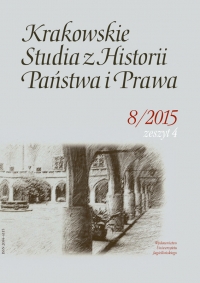
The article reviews theoretical bases of the social doctrine as well as the legitimacy of the state interference in resolving social inequalities among the population, with respect to the dynamics of the economic, political and social changes, and other factors. Subsequently, the paper maps, throughout a brief historical excursion, the development in the 19th century, when after the disappearance of feudal relations, the obsolete labor and social legislation regulating the position of an individual as well as the social classes, was changed. Social conflicts of a new quality began to emerge on the grounds of the development of the manufacturing sector. It was necessary to approach these conflicts with new instruments to be applied at economic, legal and social levels, respectively. Primarily, however, the article reflects the development after the formation of the First Czechoslovak Republic and the origins of the social legislation in the said period. Tomáš Garrigue Masaryk was the authority who outlined contours of the social doctrine in the First Czechoslovak Republic. The article further considers national and international sources as well as pertinent social legislation.
More...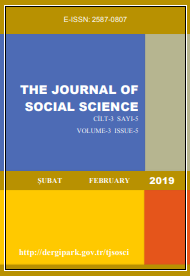
The contract for work has been implemented since the ancient history as a need for people. It was implemented for the purpose of supplying simpler goods that were not ready for purchase at the time of contract in early periods. It is emphasized that this feature does not cause harm and deception for the parties. This transaction gained its legitimacy by becoming customary law in some goods and took its place in the legal systems. It is possible to observe this situation starting from the Roman Law in line with western law and to follow it in Turkish Law. In terms of the legitimacy of this contracts in Islamic law, it is especially made emphasis to the customary law implementation especially in the Hanafis. It is accepted that there is a general acceptance due to the need and prevalence in practice. Otherwise, it will be subject to the prohibition rule on the sale of non-existing goods which is being in the classical approach. The debates in the legal nature of this contract have been significantly concluded with Mecelle in a way that responds to current needs and this is reflected in Ottoman law as well. The contract for work which has the opportunity to practice in many areas ranging from simpler topics and construction projects to the finance area, can be the subject to agreement. At this point, it is possible to talk about the aspects of Islam and Turkish Law which are more similar than the points they are separated.
More...
The probationary conviction of adults is the veritable probationary conviction. It is a general institute, which finds application with regard to all crimes and forms of criminal deeds. Its significance is expressed in the attainment of the goals of the punishment with postponement of its effective serving, but with imposition of preventive, correctional and reforming over the convicted person.
More...
The problem of suspended sentence and the juvenile criminal responsibility is discussed in the following article. Here are comment the articles of the Criminal Code and the articles of the specialized act for restriction of the juvenile criminal behavior.
More...
The Criminal Code which came into effect on10 July 2017 (''Republic Srpska Official Gazette“, No 64/17) for the first time includes the criminal act of stalking in Republic of Srpska legislation, in its Article 144. Stalking has been included in Chapter XIII, within the group of criminal acts against citizens’ rights and freedoms. With this act, Republic of Srpska has joined the family of those European countries which apply Article 34 of the Convention on Preventing and Combating Violence against Women and Domestic Violence, to incriminate such deliberate behaviour, where repeated threats made to another person cause that person’s fear for their safety.In an assessment of significance of the new incrimination, this study shows results of an analysis of legal regulation relevant to stalking as a criminal act in other European countries, along with an overview of the historic development and judicial practices aiming to provide an explanationof the legal text dedicated to stalking as a criminal act int he Republic of Srpska. The legal text has been analysed from these two aspects: legal-criminal and criminal-political.Empirical research results have also been shown, where the topic of the research was the presence of stalking amongst final grade secondary school students. The research sample was consisting of 189 senior students of Grammar School Filip Višnjić in Bijeljina, out of what 128 female and 61 male students. The results show that as many as 26 senior students, i.e. 13.7% of total number of subjects, have been victims of stalking, interpreted as described in the provisions of Article 144 of The Republic Srpska Criminal Code. The results obtained confirm justifiability of incriminating such acts which mean the criminal act of stalking, as well as a need of broader education of the public on their rights guaranteed by the state and on mechanisms of protecting these rights.
More...
Mesopotamia, whose origins date back to prehistoric times, is considered to be the oldest civilization. In spite of many serious gaps in the research material, the scientific research suggests that there are quite surprising solutions regarding the links between law and religion. The first legal regulations in the Sumerians are connected with the development of cities and leadership, clearly set in their religious beliefs. The institution of a king, appointed in this civilization quite early, is understood as an intermediary between the divine and the human world. This does not, however, equate religion with politics, as it is evidenced by the legal regulations in Mesopotamia. The king who is a law representative is not a representative of the deity. The established norms mean that he does not treat the subordinates as coming from god. It proves the separation between the Sumerian politics and religion. They are not yet aware of the consequences of this distinction, as it is evidenced by their inconsistency in terms of sanctions. By establishing the penalty for disobedience against the law he creates, the king refers to the deity, which in this way, without being a source of law, is treated as its protection.
More...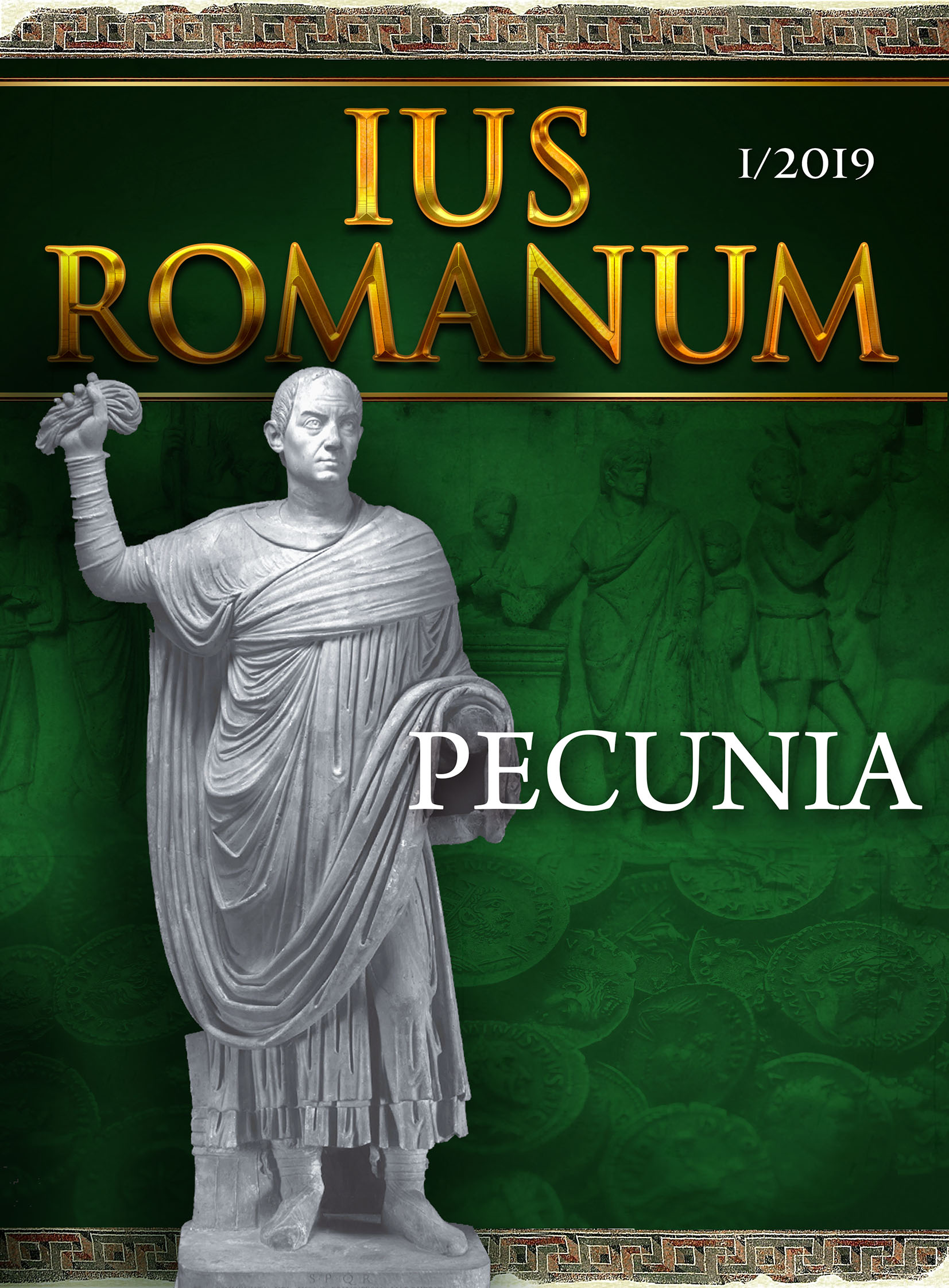
The article reviews the possible objects included in the treasure, the regulation of this legal institute in ancient Rome, and the possibility of application of Roman Law in comparison with Art. 351 of the Spanish Civil Code in relation to the at-tribution of scientific discoveries and art production to the treasures.
More...
The article deals with the acquisition of property according to texts from Varon`s work „De re rustica“. The sale and the mancipatio are examined in De re rust. 2.1.15 and 2.10.5, as well as the rule “emptionibus et traditionibus dominum mutat” in De re rust. 2.6.3.
More...
In the 6th century in the Byzantine Empire the problems of the state administration led to disintegration and the social order was shaken. Urgent measures are needed to change and balance the social, economic and administrative structure of the Empire in order to fulfill Emperor Justinian's plans for the renovatio imperii. The interne and extern stability of the state has been made conditional on an increase in tax revenues and other fiscal measures. The article tracks the legal measures in collecting the taxes, but also the protection of taxpayers from abuses of the tax administration, alleviating the tax burden etc.
More...
The possibility that the usufruct relapses on any good of the heritage was intro-duced by a senatusconsultum the middle of the I century. Apparently this exten-sion affects squarely the nummerata pecunia, but this appraisal needs to be tint-ed, since really the money is not a consumable good, that is to say, that does not disappear with his first use, but it is a good, which usefulness resides in his dis-position and which as other goods on which he arranges stops being in the pat-rimonial assets of the dominus; for it what awards the usufruct of money to the usufructuary is the capacity of disposition which the usufructuary lacks because it is not proprietary. The senatorial decision according to the expression of Gaius censures what he considers to be a “natural reason”: “naturalis ratio acutoritate senatus commutari potuit”.
More...
The Tabula Baetica, Formula Baetica, or Bronze de Bonanza, as it is also known for the place where it was found towards the end of S. I A. C. or principles of S. II A. C., it could be a simple model or form, or a real authentic fiduciary business document. In the present work we will perform an exegesis as detailed as possible of the text, comparing it with other sources that contemplate different institutions for the purposes of real guarantee.
More...
This article deals with the question about the correlation between the legal relations based on land servitudes and on legal relations resulted by the proximity of real estates. In the paper are reviewed the similarities and the differences between these two legal relations. It is outlined that nevertheless the two legal figures differ between them, often they are mixed each other and identified as same matter. The author made an analysis of the reasons why this mixture is widely admitted and he carefully examined its genesis starting from the period of the Roman law. Also the author considers that even though these institutes have some common features, both legal relations are different by their essence, functional mechanism and the legal effects. In the frame of this comparison are outlined also the specific differences which characterize both of them. As a conclusion the paper reveals methodical and cognitive marks which can be taken into account in future research and analysis of apparently close but at the same time different legal figures of the Property Law.
More...
The article deals with the possibility of developing tax decentralization and its main part – the institute of local taxes in Bulgaria. Local taxes are charged by the municipalities and are established by the Local Taxes and Fees Act. According to the fifth amendment to the Constitution of the Republic of Bulgaria the Municipal Council determines the amount of the taxes within the range established by the law (till the end of 2007 the rates and amounts of local taxes were provided for by the law). There is analyzed application of the principle for statutory establishment of tax liabilities in the spirit of the principle of the fiscal decentralization.
More...
The article examines the procedure of peaceful solution of the disputes and the view of the circumstantial check as processual forms of the peace jurisdiction in resolving of civil disputes regarding the possession, the borders, the servitudes and the harms of the real estates. In the text are analyzed the advantages of these processual actions of the peace jurisdiction court and it is made a comparison between similar forms applied in the jurisdiction of the common courts.
More...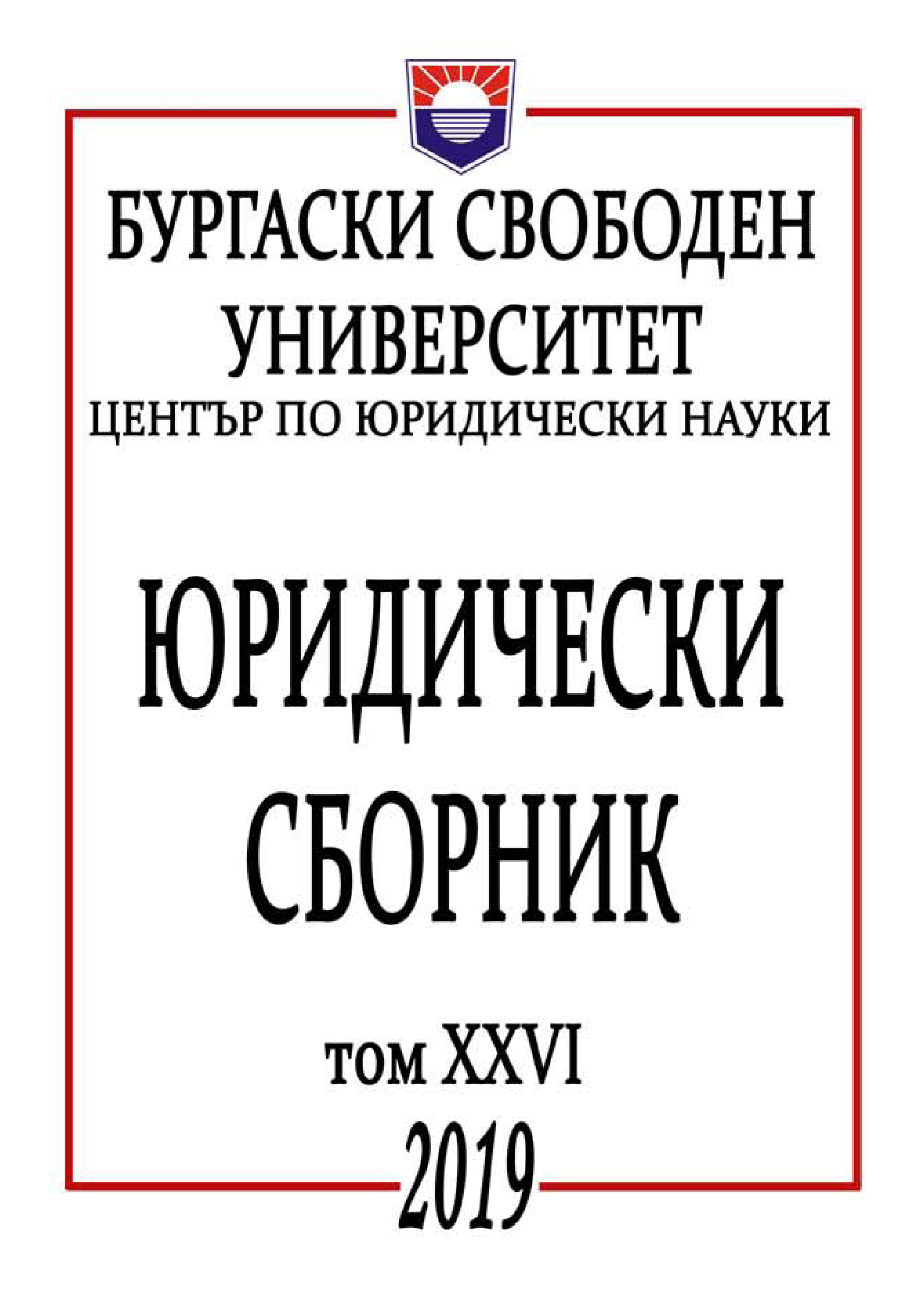
The article discusses the frequent cases of irregular summons to parties in district court cases due to their emigration and the problems they face in calling for them, as well as the inability to protect their interests due to the lack of electronic summons and e-justice at the moment. The necessity of electronic summons and e-justice in the Republic of Bulgaria is argued.
More...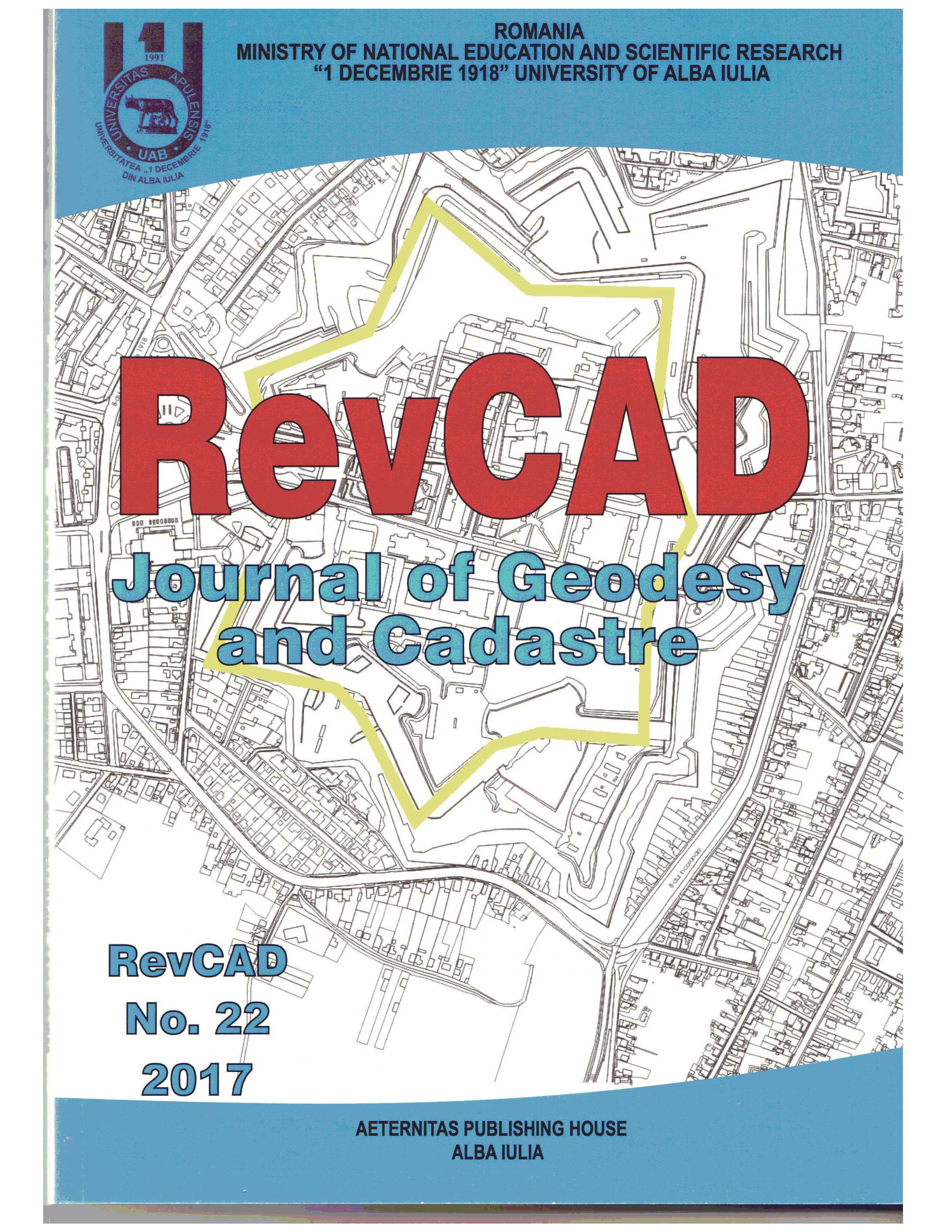
A new market value-based system for real property appraisal for tax purposes has been in the process of implementation in Moldova since 2004. The relevance and importance of such appraisal has been increasing with time, requesting improvements to the current mass valuation methodology and review of the roles played by diverse authorities and in particular by local governments, tax and cadastral authorities in property appraisal for tax purposes. The article presents a comparative analysis of diverse options for funding and handling mass real property valuation efforts. Suggestions have been developed to perform property revaluation intended to update databases and to expand the current tax base.
More...